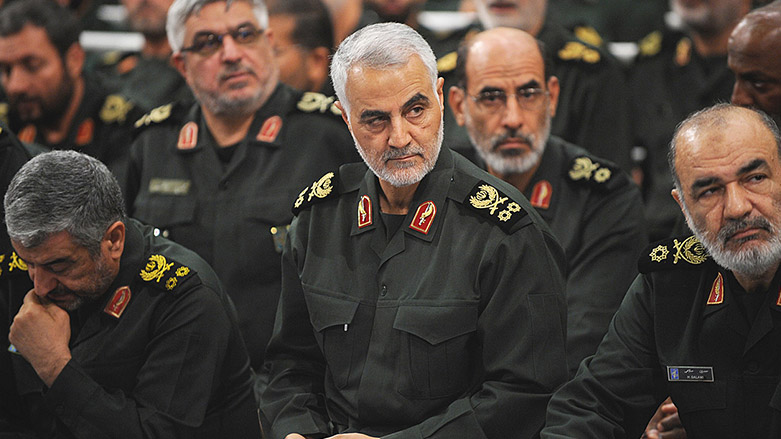US coordinates anti-Iran policy with Gulf states; acknowledges that Iran is a threat in Iraq

WASHINGTON DC, United States (Kurdistan24) – US Secretary of State Mike Pompeo visited Abu Dhabi on Tuesday to meet the emirate’s Crown Prince Mohammed bin Zayed Al-Nahyan, who is also Deputy Supreme Commander of the United Arab Emirates (UAE) Armed Forces, and UAE Foreign Minister, Sheikh Abdullah bin Zayed Al Nayhan.
In parallel with Pompeo’s stop in Abu Dhabi, other State Department officials visited Saudi Arabia and Bahrain, as the US coordinates anti-Iranian measures among just three Gulf Arab allies (notably, Kuwait, Qatar, and Oman do not seem involved.)
Describing America’s diplomatic efforts, Pompeo told the UAE newspaper, The National, that with the easing of sanctions after the nuclear deal, Iran increased its funding for proxy forces: Lebanese Hizballah, Yemen’s Houthis, and “the Shia militias fighting in Iraq and in Syria.”
Until recently, US officials did not acknowledge that Iran’s support for Shia militias in Iraq represented a serious challenge. Rather, they chose to believe that because those militias had been formally incorporated into the Iraqi Security Forces (ISF), they were not a problem—although they still answered to Tehran, rather than Baghdad.
Since Pompeo became Secretary of State, however, that seems to have changed. For some time, he has been more outspoken than other US officials about Iran’s role in Iraq.
Last October, for example, US officials were slow to acknowledge the involvement of Iranian-backed militias in Iraq’s attack on Kirkuk, including the role of Maj. Gen. Qassim Soleimani, head of the Quds Force of Iran’s Islamic Revolutionary Guard Corps. However, Pompeo, as CIA Director, became the first US official to do so, affirming three days later, that Soleimani had, indeed, been in Kirkuk during the assault.
On Tuesday, Pompeo told The National, “Soleimani is causing trouble throughout Iraq and Syria, and we need to raise the cost for him,” for “his organization and for him personally.”
“We’re working closely with the Iraqis,” Pompeo explained, to ensure that as they form a new government, a typically protracted process in Baghdad, there will be “an Iraq for Iraqis, not influenced by Iran, but rather comprised of the various groups: the Kurds, the Sunnis, the Shias.”
Pompeo meets with Iraqi Prime Minister Haider al-Abadi on Thursday in Brussels, Belgium, in the context of a ministerial meeting of the US-led coalition against the Islamic State (IS) following the NATO summit.
The US had expected that Abadi would win the May 12 elections, but his list came in third, behind that of the mercurial Iraqi cleric, Muqtada al-Sadr, and that of the Iranian-backed militias. Thus, it is unclear, how much ability Abadi really has to check Iranian influence in his country.
Pompeo also meets briefly with the Saudi Foreign Minister on Thursday. Presumably, they will affirm the understandings reached earlier this week, as US representatives of the State and Treasury departments met in Riyadh with their Saudi counterparts.
A key objective in the US-Saudi talks is to ensure that sufficient oil supplies are available world-wide to keep prices stable, as the US moves to cut off Iranian oil exports. That effort seems to be succeeding, as Saudi production rose by 500,000 barrels per day in June
Iranian activities in Syria are also a major US concern. As Pompeo told The National, “The Iranian presence in Syria is not appropriate and won’t be tolerated.”
“We’re working diligently to develop a political solution” that achieves the goal of defeating the IS remnants and that “leads Iran to the place where they conclude it’s not worth the candle for them to be in Syria.”
Pompeo provided little detail of how he intended to do that, however. So far, the presence of the US-backed, Kurdish-led Syrian Democratic Forces in northeastern Syria has served to block Iran in that area, as has a small US-backed garrison of Arab fighters at al-Tanf, on the Syrian-Iraqi border, sitting astride the main highway from Baghdad to Damascus.
The al-Tanf garrison has come under sporadic assault. However, any attacking force is vulnerable to air strikes in the open desert, so no serious threat has really materialized, and the US remains committed to maintaining a presence there.
“Nothing has changed in regards to al-Tanf.,” Col. Sean Ryan, Spokesman for the US-led Coalition against IS, told Kurdistan 24 on Tuesday, “Our partner forces are still fighting [IS] in that area.”
President Donald Trump, however, has said that he wants US forces to leave Syria, as soon as possible. Yet Iran would step into the vacuum, if they left in haste.
Some parties, including Israeli Prime Minister Benjamin Netanyahu, are seeking the assistance of Russian President Vladimir Putin to limit Iran’s presence in Syria. Indeed, Netanyahu was in Moscow on Wednesday in an effort to do just that.
Others, however, such as Washington’s highly-regarded Institute for the Study of War, argue that the alignment between Moscow and Tehran “is not an alliance of convenience,” but “a strategic partnership based on shared long-term interests,” and Putin is “highly unlikely” to deliver on any promises to contain Iran.
Trump meets Putin in Helsinki next week, and his approach to dealing with this challenge should become clearer soon.
